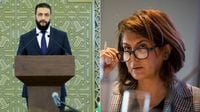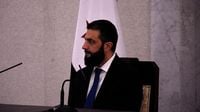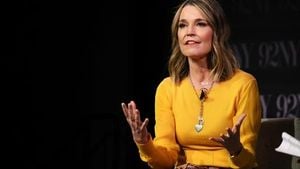On Saturday, March 29, 2025, Syria's interim President Ahmed Al-Sharaa announced a new transitional government that aims to steer the nation following the ousting of Bashar al-Assad's regime. This new cabinet, which replaces the caretaker authorities that have been in place since December 8, 2024, is characterized by a strong presence of close allies and marks a significant step in the country's ongoing recovery from a devastating civil war that lasted 14 years.
The announcement of the new government was initially scheduled for earlier in March but came as international calls for an inclusive transition grew louder in the wake of recent sectarian violence. Al-Sharaa, who is also the leader of the Islamist group Hayat Tahrir al-Sham (HTS), was appointed interim president in late January 2025, shortly after the regime's fall.
Among the noteworthy appointments in this new government is Hind Kabawat, a veteran opposition figure and member of Syria's Christian minority. Kabawat has been appointed as the social affairs and labor minister, making her the first woman to hold a ministerial position under Al-Sharaa's leadership. She has been a longstanding opponent of the Assad regime and was part of the preparatory committee for the national dialogue conference held in February 2025.
In addition to Kabawat, the cabinet retains some familiar faces: Assaad al-Shaibani continues as Foreign Minister, and Murhaf Abu Qasra remains Defence Minister. Anas Khattab, who previously led the general intelligence, has been appointed as the interior minister. Raed al-Saleh, the prominent leader of the White Helmets, has taken on the role of minister of emergency situations and disasters.
The new government comes amid promises from the Islamist-led authorities to protect minority groups, particularly after recent clashes between Alawite gunmen and security forces linked to Sunni rebel factions resulted in civilian casualties. These developments have underscored the delicate balance the new leadership must maintain as it seeks to unify a fractured nation.
In December 2024, a caretaker government, headed by Mohammad al-Bashir, was established to guide the country until a permanent cabinet could be formed. The transitional period is set to last for five years, as outlined in a constitutional declaration signed by Al-Sharaa earlier this month. However, some experts and rights groups have raised concerns that this concentration of power in Al-Sharaa's hands may not adequately protect the rights of minority groups.
The significance of Kabawat's appointment cannot be overstated, considering her background and the current political climate. As a member of the Christian minority, her role represents a potential shift towards greater inclusivity in a government that has been criticized for its Islamist leanings. Her involvement in the national dialogue conference earlier this year signifies a commitment to engaging diverse voices in the rebuilding process.
"This is a pivotal moment for Syria," Kabawat stated after her appointment, emphasizing the need for unity and collaboration among all factions of society. Her perspective as a longtime Assad opponent and a representative of a minority group offers a unique lens through which to view the challenges ahead.
Despite the optimistic outlook presented by the new government, the road to stability remains fraught with challenges. The recent sectarian violence has highlighted the fragility of peace in Syria, and the new leadership must navigate these tensions carefully to avoid further conflict.
As the international community watches closely, the new government will need to prove its commitment to inclusivity and justice for all Syrians. The stakes are high, and the world is keenly aware of the lessons learned from past administrations that have failed to address the needs of diverse populations.
With the transitional period now officially underway, the focus will be on how Al-Sharaa's government will address the pressing issues facing the nation, including reconstruction, reconciliation, and the establishment of a more representative political framework. The eyes of the world are on Syria, and the new leaders must act decisively to restore faith in a future free from the shadows of dictatorship.
As the government settles into its roles, the hope is that the inclusion of figures like Kabawat will pave the way for a more balanced and fair approach to governance. The journey to healing and rebuilding Syria is just beginning, and the new leadership will be tested in the coming months as they strive to unite a divided country.






